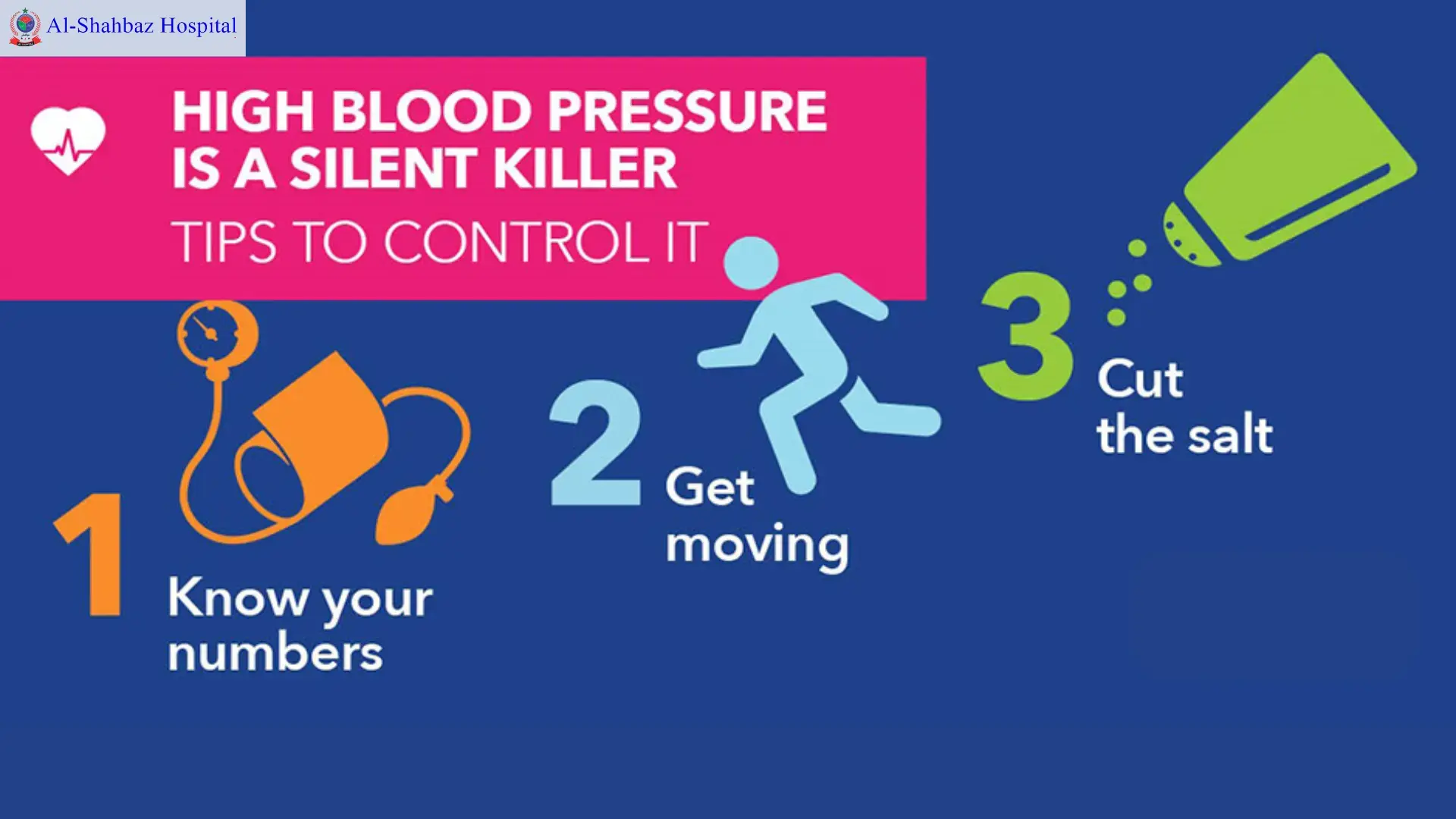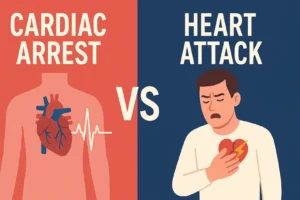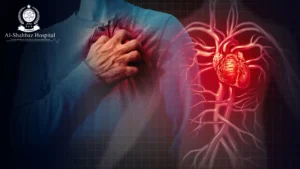High blood pressure, medically known as hypertension, is one of the most dangerous yet silent health conditions affecting millions in Pakistan. Often asymptomatic until severe damage has occurred, it is rightly called the “silent killer.” According to the Pakistan Hypertension League, nearly 1 in 3 adults in Pakistan suffers from elevated blood pressure, but many remain unaware of their condition until a heart attack, stroke, or kidney failure strikes. This alarming trend highlights the urgent need for better awareness, regular check-ups, and access to quality healthcare across the country.
In this blog, we’ll uncover why high blood pressure is so dangerous, how to recognize early signs, and the best prevention and management strategies.
What Is High Blood Pressure?
High blood pressure (HBP) occurs when the force of blood against the artery walls is consistently too high. A normal reading is considered 120/80 mmHg, while readings consistently above 130/80 mmHg indicate hypertension.
Categories of Blood Pressure (According to WHO & AHA):
| Category | Systolic (mmHg) | Diastolic (mmHg) |
| Normal | Less than 120 | Less than 80 |
| Elevated | 120-129 | Less than 80 |
| Hypertension Stage 1 | 130-139 | 80-89 |
| Hypertension Stage 2 | 140 or higher | 90 or higher |
| Hypertensive Crisis | 180+ | 120+ |
Alarming Statistics – Hypertension in Pakistan and Globally Pakistan’s Hypertension Crisis
| Statistic | Percentage | Source |
| Overall adult prevalence | 18-35.1% | National Health Survey Pakistan, Rural Punjab Studies |
| Adults over 45 years | 33% | National Health Survey Pakistan |
| Awareness rate among hypertensive patients | 62.3% | Rural Central Punjab Study (2017) |
| Treatment rate among diagnosed patients | 75.3% | Rural Central Punjab Study (2017) |
| Controlled hypertension rate | 12.5% | Pakistan Health Survey |
| Projected increase by 2040 | 7.7% | BMC Public Health (2023) |
Global Hypertension Landscape
Global Hypertension Statistics
| Region/Statistic | Data | Source |
| Global prevalence (adults) | 1.3 billion | World Heart Federation (2024) |
| Annual deaths from hypertension | 10 million | WHO Global Report (2023) |
| Diagnosed patients globally | 54% | WHO Global Report (2023) |
| Patients receiving treatment | 42% | WHO Global Report (2023) |
| Patients with controlled BP | 21% | WHO Global Report (2023) |
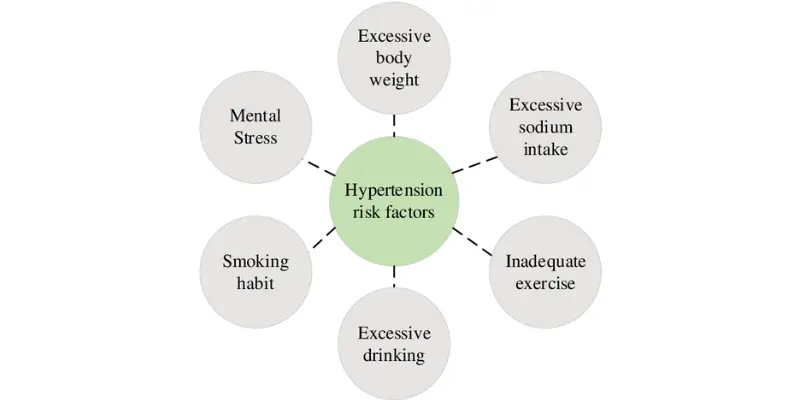
Risk Factors and Causes of High Blood Pressure
Non-Modifiable Risk Factors
- Age and genetics
- Family history
- Gender differences
Modifiable Risk Factors
- A diet high in sodium and processed foods (Pakistani dietary patterns)
- Physical inactivity (urban lifestyle in Pakistan)
- Obesity and weight management
- Smoking and tobacco use
- Excessive alcohol consumption
- Stress and mental health factors
- Sleep disorders
Pakistan-Specific Risk Factors
- High salt intake in traditional Pakistani cuisine
- Urbanization and lifestyle changes
- Limited healthcare access in rural areas
- Cultural dietary preferences
Warning Signs and Symptoms to Watch For
Common Symptoms
- Headaches and dizziness
- Shortness of breath
- Chest pain
- Vision problems
When to Seek Emergency Care
- Hypertensive crisis symptoms
- Stroke warning signs
- Heart attack indicators
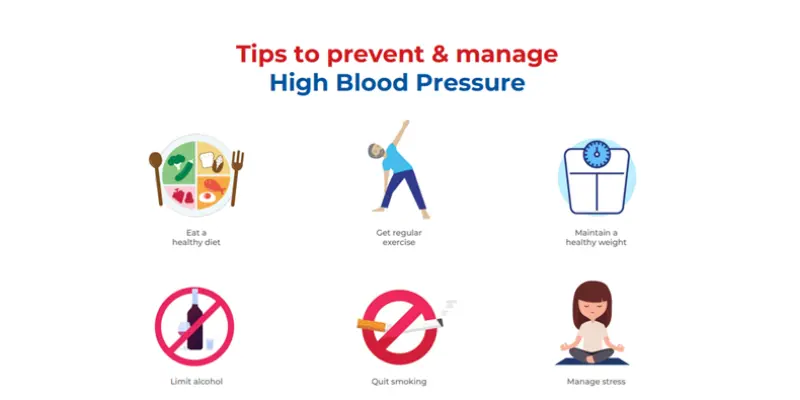
Prevention Strategies for High Blood Pressure
Dietary Modifications
- DASH diet principles
- Reducing sodium intake in Pakistani cuisine
- Increasing potassium-rich foods
- Limiting processed foods
- Healthy cooking methods for traditional dishes
Lifestyle Changes
- Regular physical activity recommendations
- Weight management strategies
- Stress reduction techniques
- Sleep hygiene practices
- Smoking cessation programs
Regular Health Monitoring
- Blood pressure screening frequency
- Home monitoring techniques
- Healthcare provider consultations
Treatment and Management
1. Lifestyle Changes (First Line)
Doctors often recommend lifestyle modification as the first defense against early-stage hypertension.
2. Medications
If lifestyle changes aren’t enough, medications are prescribed, such as:
- ACE inhibitors
- Beta-blockers
- Diuretics
- Calcium channel blockers
Always follow the dosage strictly under your doctor’s guidance.
Creating a Comprehensive Prevention Plan
Personal Action Steps
- Risk assessment checklist
- Goal setting for blood pressure control
- Building support systems
- Tracking progress
Community and Policy Interventions
- Public health initiatives in Pakistan
- School and workplace programs
- Government policy recommendations
High Blood Pressure in Older Adults (50+ in Pakistan)
As per local surveys:
- Over 50% of men and women above 50 in Pakistan have high blood pressure.
- Poor dietary habits and a sedentary lifestyle post-retirement increase risk.
Conclusion
High blood pressure is a silent but deadly condition affecting a significant portion of Pakistan’s population. But with the right awareness, early diagnosis, lifestyle changes, and access to care, you can lead a healthy, active life.
Don’t wait for a stroke or heart attack to learn your numbers.
Visit Al Shahbaz Hospital today for expert cardiovascular and hypertension care.
How Al Shahbaz Hospital Can Help
At Al Shahbaz Hospital, Kahuta, Rawalpindi, we offer:
- 24/7 blood pressure monitoring
- Access to expert cardiologists and internal medicine specialists
- In-house diagnostics, ECG, and laboratory support
- Personalized hypertension management plans
- Free awareness camps and community screenings
Frequently Asked Questions (FAQs)
What is considered normal blood pressure in Pakistan?
Normal blood pressure is generally below 120/80 mmHg regardless of location. However, individual targets may vary based on age, health conditions, and risk factors. Pakistani healthcare guidelines follow international standards.
How common is high blood pressure in Pakistan?
Studies show that 18-35% of Pakistani adults have hypertension, with rates being particularly high in urban areas and among people over 45 years old, where prevalence reaches 33%.
What are the most effective ways to prevent high blood pressure?
Key prevention strategies include maintaining a healthy weight, following a low-sodium diet, regular physical activity, limiting alcohol, not smoking, managing stress, and getting adequate sleep.
Can high blood pressure be reversed naturally?
While genetic predisposition cannot be changed, many people can significantly lower their blood pressure through lifestyle modifications, including diet, exercise, weight loss, and stress management.
What Pakistani foods should I avoid if I have high blood pressure?
Limit high-sodium foods like pickles, processed meats, ready-made spice mixes, packaged snacks, and excessive use of salt in traditional dishes. Also, to reduce fried foods and sugary beverages.
How often should I check my blood pressure?
Adults should have their blood pressure checked at least every two years if normal, annually if slightly elevated, and more frequently if diagnosed with hypertension or at high risk.
What are the costs of hypertension treatment in Pakistan?
Treatment costs vary widely, from basic generic medications costing 500-2000 PKR monthly to specialized care and brand-name drugs that can cost significantly more. Government programs may provide subsidized care.
Are there any government programs in Pakistan for hypertension management?
Yes, Pakistan has various public health initiatives, including the National Action Plan for Prevention and Control of Non-Communicable Diseases, which includes hypertension management programs.
What complications can untreated high blood pressure cause?
Untreated hypertension can lead to heart disease, stroke, kidney disease, vision problems, sexual dysfunction, and an increased risk of dementia.
Can stress cause high blood pressure?
Yes, chronic stress can contribute to high blood pressure through various mechanisms, including increased heart rate, blood vessel constriction, and unhealthy coping behaviors like overeating or smoking.


